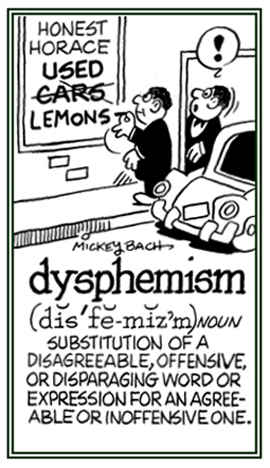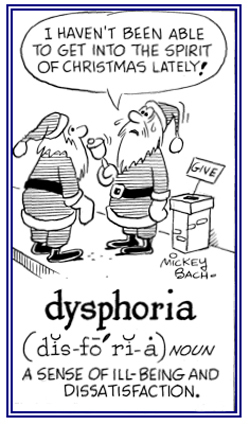dys-
(Greek: bad, harsh, wrong; ill; hard to do, difficult at; slow of; disordered; impaired, defective)
dysphasia
1. Impairment of, or incoherent, speech resulting from a brain lesion.
2. Defective use or understanding of language caused by brain damage.
3. Difficulty in speaking and understanding spoken or written language, caused by a brain injury or a disease.
2. Defective use or understanding of language caused by brain damage.
3. Difficulty in speaking and understanding spoken or written language, caused by a brain injury or a disease.
dysphasic
Characterized by the impairment of speech resulting from a brain lesion.
1. An offensive expression or word that is deliberately substituted for a neutral one: Ted's brother used a dysphemism when he was talking about visiting a friend who was in a "loony bin" instead of saying in the "mental hospital".
2. Any physical impairment or problem when speaking: Jan was so chilly from being in the winter storm that she could only explain what happened with dysphemisms of stutters.

© ALL rights are reserved.
Go to this Word A Day Revisited Index
2. Any physical impairment or problem when speaking: Jan was so chilly from being in the winter storm that she could only explain what happened with dysphemisms of stutters.

Go to this Word A Day Revisited Index
so you can see more of Mickey Bach's cartoons.
dysphonia
1. Difficulty in producing articulate speech sounds.
2. Impairment of the voice manifested by hoarseness or other defects of phonation due to organic, functional, or psychic causes.
3. Difficulty in speaking; hoarseness which may be due to public speaking.
2. Impairment of the voice manifested by hoarseness or other defects of phonation due to organic, functional, or psychic causes.
3. Difficulty in speaking; hoarseness which may be due to public speaking.
The term also refers to the change or breaking in the voice of boys during puberty.
dysphonic
An abnormal misery or the state of feeling acutely hopeless, uncomfortable, and unhappy: The doctor told Kate that she was suffering from dysphoria, an emotional mood characterized by depression; possibly because she has not been able to get the kind of job for which she had trained for at her university.

© ALL rights are reserved.
Go to this Word A Day Revisited Index

Go to this Word A Day Revisited Index
so you can see more of Mickey Bach's cartoons.
dysphoric
dysphotic zone, disphotic zone
The zone of intermediate light inensity in a body of water, with insufficient light for photosynthesis but sufficient light for behavioral responses.
dysphrasia
1. Impairment of speech due to a brain lesion; dysphasia.
2. Defective speech caused by impairment of the intellect.
2. Defective speech caused by impairment of the intellect.
dysphylaxia
Premature spontaneous arousal from sleep, such as early morning waking.
dyspigmentation
An abnormality of the skin or hair pigment (natural substance in plant or animal tissue that gives it its color).
dyspituitarism
Any condition due to a disorder of the pituitary body.
Medically, abnormal development or growth of a part of the body; such as, an organ, bone, or cell, including the total absence of such a part: "One example of dysplasia is in the respiratory tract in smokers or retinal dysplasia in the abnormal formation of the retina (back of the eyeball) during embryonic (pre-birth) development."
dysplastic
1. A reference to the abnormal development of organs or cells, or an abnormal structure resulting from such growth.
2. Characterized by the unusual development or growth of a part of the body; such as, an organ, bone, or cell; including the total absence of such a part.
2. Characterized by the unusual development or growth of a part of the body; such as, an organ, bone, or cell; including the total absence of such a part.


